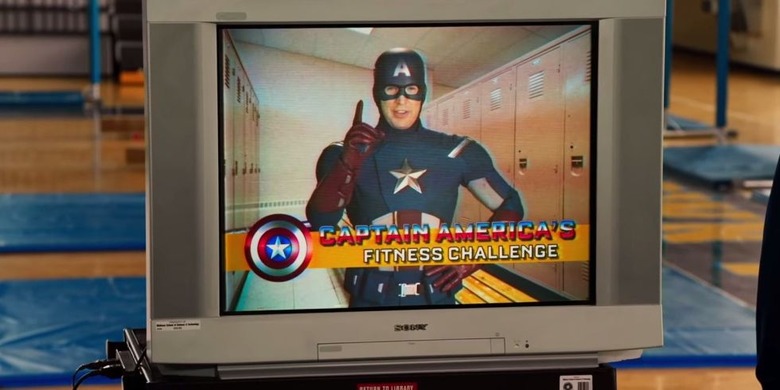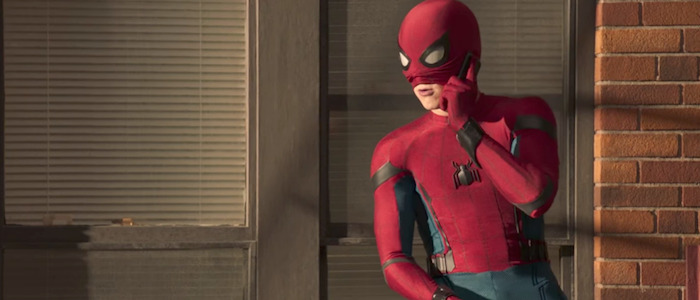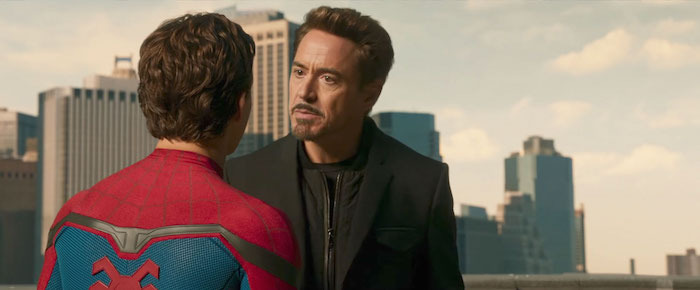Road To Endgame: 'Spider-Man: Homecoming' Is A Great 'Iron Man 4,' But A Middling Spidey Movie
(Welcome to Road to Endgame, where we revisit the first 22 movies of the Marvel Cinematic Universe and ask, "How did we get here?" In this edition: Spider-Man: Homecoming offers an on-the-ground perspective of the Avengers' world, but little else)The film's "Homecoming" sub-title sent a singular message to fans worldwide: this was Spider-Man back where he belonged, at the House of Ideas, alongside characters he'd shared the page with for over 50 years. In order to re-establish him, Marvel Studios would need to answer a key question following his MCU debut in Captain America: Civil War:Where does Spider-Man fit in a world of Avengers?The resultant film, Spider-Man: Homecoming, answers in great detail. It weaves this question into its text, and in doing so, it even adds dramatic heft to the post-Civil War character arc of Tony Stark (Robert Downey Jr.), the studio's flagship character. However, in the process, the story of Spider-Man himself is left wanting.
The Adjacent Avenger
Tom Holland was to be the third on-screen Spider-Man since 2007, and so separating him from his predecessors became imperative. In both prior incarnations, Sam Raimi's Spider-Man trilogy and the Marc Webb-directed The Amazing Spider-Man films, Spidey was the only hero around, and had to rise to the occasion no matter how big the threat. Holland's Peter Parker however — younger, smaller and of meeker demeanour — exists in a setting much like our own: a world where kids have grown up watching the Avengers.With great power comes great responsibility — but what of someone with, say, medium power, in a world of Gods and monsters? For what, and to whom, is this Spider-Man responsible? For better or worse (arguably for both), Spider-Man: Homecoming is about establishing Peter Parker's place in the larger MCU. This goal drives both the fictional dramatic narrative, as well as the real-world meta-narrative for curious audiences.Parker wrestles with trying to be a hero in a world where heroism itself is changing. The film fleshes out the margins of the Marvel Universe by using Spider-Man for its on-ground perspective; Spidey may technically be a superhero, but he sees the Avengers through the eyes of the common citizen.Spider-Man: Homecoming is unique in how small and intimate it feels for a Marvel movie, and it has a distinct sense of time and place. This New York City is familiar, from its diversity, to the cats that frequent its corner stores, to the multitude of Queens cuisines. But it's also a New York City where bank robbers armed with alien tech run around in superhero masks; a city that's been altered by the terrifying events of The Avengers.This Peter Parker is for the kids; not through Snapchat and EDM (oh, what could have been), but because he never had to adjust to a world where "New York" suddenly became synonymous with a devastating attack. Like children too young to remember 9/11, the massive, world-changing shifts in global power and security in response to such an event — the kind of changes the other Avengers continue to quarrel over — are simply Parker's normal.
The Story on the Ground
Spider-Man: Homecoming opens on Adrian Toomes/The Vulture (Michael Keaton), a contractor hired to clean up the Avengers' mess shortly after The Avengers. However, Tony Stark's own "Damage Control" initiative, in conjunction with the U.S. government, steals Toomes' contract from under him. Toomes is one of the forgotten "little guys" of this universe, and his blue-collar resentment against the billionaire Stark is entirely justified.Like Tony Stark prior to the events of Iron Man, Toomes is an arms dealer, albeit on a local level. And like Stark, all Toomes is really doing is adapting to a changing world, even if it means fashioning a suit from alien tech and stealing from the Avengers. Toomes, like Peter Parker (and like the film itself) exists in the Avengers' shadow — it's as if Spider-Man: Homecoming is Marvel's first spin-off film.By this point in the series, Marvel's political fabric had rightly become central to its storytelling. The rift in the Avengers' ranks was now pivotal to the larger narrative, but in the meantime, Spider-Man's story would function as a light-hearted reprieve, while slyly setting up the emotional fallout for Tony Stark in Avengers: Infinity War.The Sokovia Accords, written to curb the Avengers' collateral damage, place Parker under Stark's watchful eye, but Parker's street-level heroism is a way for him to impress his way to Avenger status. This setup is perfectly poised. Parker wants to be an Avenger. He wants the big battles and the dangerous criminals, and all things Marvel is known for, but Stark needs him to stay put, lest he have another death on his conscience.The mechanics of Spider-Man: Homecoming are geared towards delineating Spidey from the other heroes; he's established not through his successes, but through his screw-ups. This world of superheroes and arms dealers is too big for him to handle, and his story is much more interesting when it centers on high-school drama, or on saving a single life — especially the life of a villain.By the end of the film, Parker separates himself from the rest of the series. He rejects becoming an Avenger in order to return to the more "realistic" settings of New York streets, smaller battles and helping common folk. But how much weight can this resolution really hold for Parker, when all it does is fall back on Marvel's original sin of affirming the status quo?
The Passive Peter Parker
Spider-Man: Homecoming is breezily paced. It's imbued with moment-to-moment joy, taking full advantage of director Jon Watts' ability to craft realistic child characters without being patronizing (his Cop Car is a must). But what is the film ultimately about, outside of its own meta-textual mechanics? Parker's choice to return to Queens, rather than joining the Avengers, isn't rooted in any discernible ethos. It's merely part of a narrative check-list.When Parker screws up, biting off more than he can chew on the Staten Island Ferry, his break from web-slinging is a necessary lull, and an opportunity for him to interact with stories he ignored while Avenging. This theme is all but vocalized by Liz (Laura Harrier), Parker's homecoming date and Adrian Toomes' daughter, as she's forced to leave New York toward the end of the film. Unbeknownst to her, Parker — unable to see the big picture when bringing down Liz's father — is indirectly responsible for her predicament.And yet, the film sees Parker going right back to fighting villains he was explicitly told not to in Avengers: Infinity War, without any sort of reflection or learning dramatized in Spider-Man: Homecoming. The story offers little by way of change or dilemma en route to Parker's big decisions; it's The Amazing Spider-Man 2 problem all over again. In both films, Peter Parker fails to consider the ripple effects of his actions, grappling with neither power nor responsibility in the process.That Parker succeeds in stopping The Vulture is fantastic. That he saves The Vulture from dying is even better, especially in a series that tends to treat death so casually. But building a film that leads to this climax without having Parker contend with his actions — either before or after his big battle — leaves this coming-of-age story without any actual coming of age.Jumping back into battle is exactly what a character like Spider-Man would do — and has done, both in the Raimi films and his many comic and cartoon appearances — but doing so after wrestling with his decisions has historically made for more interesting narratives. Placing Spider-Man in a story where he has to both reject heroism and simultaneously chase it is a have/eat cake scenario. It isn't unworkable, but Homecoming isn't interested in getting in the between this dichotomy in order to meaningfully explore it. Even the disastrous Amazing Spider-Man films hinted at the toll Parker's duality took on his psyche and personal relationships.Whatever internal journey catalyzes Parker's return to Queens — whether realizing Avenging is too much for him, or that he's hurt Liz by prioritizing heroics — is never dramatized. What's more, the language of the film actively subverts his decision.Parker has still saved the day by taking on The Vulture. In the process, his friend Liz has been forced to leave New York and live in shame, but this is never treated as an outcome Parker wrestles with, let alone one he understands. Even if the onus for Liz's shame is entirely on Toomes, the experience doesn't impact who Parker is at his core. He apologizes to Liz, albeit vaguely, because he sees she's upset. But there's no moment of guilt, or the temptation to tell her his secret so she knows why he's apologizing, or even a beat where he reconsiders his course of action. Thus, Parker's goodbye to Liz, a scene of literally facing the outcome of his double-life, is rendered dramatically inert.When presented with his new "Iron Spider" suit, Parker's rejection of Avenger-hood is a mere inevitability of the film's prior set up. The end points of his journey make sense on paper, but no emotional impetus leads him to turning down this new position — one he's coveted for months — and nothing or no one in particular draws him back to Queens now that Liz has been forced to move.Lip-service to looking after those on the ground is a nice enough sentiment, but Parker simply returns to ground-level, away from the Avengers, because that's where the franchise needs him to be for the Avengers' story.
Iron Man 4
After Parker screws up on the ferry, Stark threatens to confiscate his hi-tech suit. Parker pleads, "But I'm nothing without this suit," to which Stark responds: "If you're nothing without this suit, you shouldn't have it."Parker's moment of self-actualization occurs when he gets himself out from under debris. His own face is reflected back to him in a puddle, half obscured by his mask; the two sides of Peter Parker. Now without his tech, Parker must rely on his own strength, repeating "Come on, Spider-Man!" to himself as he recreates two iconic images from the comics, involving lifting and duality. But while the film gets the lifting part right, the duality feels hollow. Parker's show of strength, as he vocalizes his superhero identity, is a payoff with no coherent set-up.The scene is framed against the echo of Stark's "If you're nothing without this suit" advice, but the callback is empty as it pertains to Parker. Not only is he wearing another handy spider-suit at the time — this Spider-Man never had trouble playing vigilante before meeting Stark — Parker neither has to wrestle with his duality, nor with an over-reliance on technology, nor a heroic identity that clashes with his personal life (Aunt May finding out about Spider-Man is reduced to a joke) before arriving this emotional juncture. He may as well be following the Marvel formula of self-actualizing through punching.However, the reason this line sticks out in the broader Marvel narrative is because of what it means for Tony Stark.In Iron Man 2, Stark famously told the senate arms committee "The suit and I are one." Since then, after having to prove his mettle in The Avengers, and after shedding his addictive reliance on technology in Iron Man 3, Stark has evolved from a spoiled brat in arrested development, to a man dolling out fatherly advice on power and identity. The reset button had been pushed on his character enough times that by Avengers: Age of Ultron, the notion of repetitively correcting past mistakes with newer, bigger mistakes had become part of his narrative fabric. Rather than going in circles, as he did in his initial appearances, Stark's long-term trajectory had begun to take the form of an escalating spiral.After spending his first two films deciding whose hands were the wrong ones when it came to weaponry (and debating the right ones by punching his villains in the face), Stark spends his seventh starring role, Spider-Man: Homecoming, trying to return the world to a sense of normalcy. He feels ever-so-slightly more mature than before; when alerted to an illegal weapons deal involving Chitauri technology, Stark alerts the F.B.I. rather than intervening himself. Captain America: Civil War saw him finding renewed trust in the structures around him; he no longer rushes into battle unsupervised, unless absolutely necessary. In Homecoming we get to see what Stark's day off looks like, as he deals with the minutiae of the new status quo he helped usher in.We also get to see the ramifications of the Sokovia Accords. Stark places himself both under the law, as well as in a position to uphold it, leaving him with both the responsibility of delegating power, and the responsibility of its fallout. He trains potential new Avengers like Parker, but he's accountable for whatever mistakes they make, especially if they're hurt on the job. After learning how Charles Spencer was killed during the events Avengers: Age of Ultron, Stark can't handle another death on his conscience. And so he refuses to return Parker's suit until he's proven himself in battle (though, this too ends up being a mistake in the long run).In Captain America's absence, Tony Stark has finally stepped into the role of a leader. That's a big deal, considering Stark's soloist origins, and it's a leap forward in the overall Marvel story. But Stark's appearance here is limited to a handful of scenes. While Tom Holland's manic vlogger energy and wide-eyed innocence ensure he isn't overshadowed by Downey Jr., Spider-Man: Homecoming can't help but feel like a really good Tony Stark story nestled between incomplete Spidey adventures.Though, Spider-Man: Homecoming is also an adventure that feels true to its setting, in a way most Marvel movies don't. It allows the bursting seams of the Marvel Universe to relax between bigger installments, creating a living, breathing ground-level for the MCU, one you could step right into, populated by people you could strike up conversations with.We may not yet have a clear sense of how Peter Parker fits into his world — for my money, neither does he — but for the first time in the series, we know exactly what this world feels like when the sky isn't falling. And, now that the sky has fallen in Avengers: Infinity War, we also have a clearer picture of what's at stake in Avengers: Endgame.
***
Expanded from an article published April 23, 2018.




